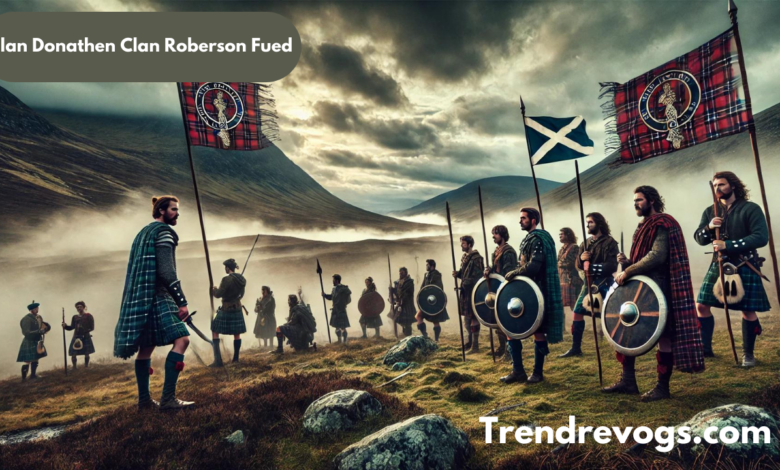The Clan Donathen Clan Roberson Fued: A Legacy of Tradition and Rivalry

The “Clan Donathen Clan Roberson fued” evokes intrigue rooted in the ancient culture of Scottish clans, where alliances, rivalries, and deep loyalties defined the landscape. The clans of Scotland have long been renowned for their intense relationships. Though there isn’t a widely recognized feud specifically between these two clans, it draws from the deeper traditions of conflict seen in similar clan rivalries, such as that between the Clan Donnachaidh (often known as Clan Robertson) and their neighbours.
To explore the “Clan Donathen Clan Roberson fued,” one must first understand the significance of Scottish clans, their historical dynamics, and how modern interpretations may have evolved into something broader, especially in storytelling, social media, and even popular culture.
The Origins of Clan Feuds in Scotland
Scottish clans historically formed in the early medieval period, often rooted in kinship groups that could trace their origins to a common ancestor. Clans provided security and structure, governing territories and even raising armies. Feuds between clans were not uncommon, as disputes over land, honour, and leadership sometimes led to bloody conflicts.
A desire for power, security, and autonomy drove clan feuds. In the Highlands, clans like the Donnachaidh and their neighbours often found themselves in direct conflict, particularly over land and leadership succession. Rivalries escalated into full-blown feuds, sometimes lasting for decades or centuries. Within this context, we explore the idea of a feud between “Clan Donathen” and “Clan Roberson.”
Clan Donathen: A Historical Context?
While “Clan Donathen” is not widely recognized in Scottish history, it could be a modern interpretation or evolution of a historical clan with similar origins. Considering the cultural and genealogical changes in the centuries following the peak of Scottish clan society, many smaller or less prominent clans have transformed in name and identity. This could be why the term “Clan Donathen” resonates with certain historical records that reflect a broader family or regional legacy.
One interpretation could be that Clan Donathen draws its roots from smaller family units within larger Highland communities, making them part of a broader cultural narrative, much like the more well-known Clan Donnachaidh.
Clan Roberson: An Alternative to Clan Robertson?
Like Clan Donathen, Clan Roberson is maybe a modernized or Anglicized version of the better-known Clan Robertson, also called Clan Donnachaidh. The history of Clan Robertson is steeped in Scottish legend and bravery, having played a crucial role in the Wars of Scottish Independence. Clan Robertson’s legacy stems from their support of Robert the Bruce, with their lands eventually established in the region of Struan.
Feuds involving Clan Robertson often revolved around land disputes with neighbouring clans, such as the Stewarts of Atholl. These conflicts shaped Highland culture’s development and many clans’ survival during turbulent times. If “Clan Roberson” is derived from Clan Robertson, it is reasonable to assume that historical conflicts involving Clan Robertson have influenced the lore surrounding this supposed feud with “Clan Jonathan.”
Feuds and Rivalries: Rooted in Legacy and Power
The concept of a feud between Clan Donathen and Clan Roberson would naturally draw from the age-old conflicts between clans vying for power and influence in the Scottish Highlands. Feuds were often sparked by territorial disputes, competition for leadership, or even perceived slights between clan leaders.
The historical Clan Robertson was involved in several major conflicts, including the murder of King James I. Robert Riach, the clan chief, who captured the king’s assassin and was rewarded for his loyalty with both land and recognition. This allegiance to the Scottish crown symbolizes the fierce dedication and pride that often lead to conflicts between clans.
Suppose Clan Donathen is interpreted as a smaller, neighbouring clan or a group with similar Highland roots. In that case, it is easy to imagine how feuds might have arisen over land, resources, or political allegiances during Scotland’s most tumultuous periods. Such feuds often persisted for generations, fueled by the desire to avenge old wrongs or assert dominance.
Modern Interpretations and Popular Culture
In recent years, clans and their histories have experienced a resurgence in popular culture, including digital storytelling, online communities, and even social media influences. The so-called “feud” between Clan Donathen and Clan Roberson may reflect this modern storytelling tradition, where historical narratives are repurposed for entertainment or cultural revival.
The role of social media has expanded the reach of Scottish clan history, enabling the creation of new narratives that appeal to a global audience. In this context, the feud between Clan Donathen and Clan Roberson could symbolize the merging of old traditions with modern interpretations, particularly when considering that both clans are deeply rooted in storytelling, legend, and cultural preservation.
From viral TikTok trends to YouTube documentaries, the stories of Scottish clans have gained new life, reaching audiences that might not otherwise engage with history. Therefore, the supposed “feud” between these two clans may be part of a broader effort to keep such histories alive, even if they take on a new, creative spin in the digital age.
Conclusion: The Lasting Legacy of Clans
The “Clan Donathen Clan Roberson fued” is best understood as part of a larger tradition of Scottish clan rivalry, where land, leadership, and loyalty dictated the rise and fall of powerful kinship groups. Though historical records may not explicitly confirm this specific feud, the idea draws from a rich history of Scottish clans engaged in conflict, particularly in the Highlands.
Modern interpretations of these feuds, amplified by social media and popular culture, continue to breathe life into the legacy of Scottish clans, offering a glimpse into the past while making it relevant to contemporary audiences. The appeal of such stories lies not only in their historical significance but in their ability to capture the imagination, allowing people today to connect with a bygone era of fierce loyalty and unyielding pride.
In the end, whether the “Clan Donathen Clan Roberson fued” is based on actual historical events or a modern reimagining, it is a testament to the enduring power of Scottish clans in shaping cultural identity, both in the past and present.




